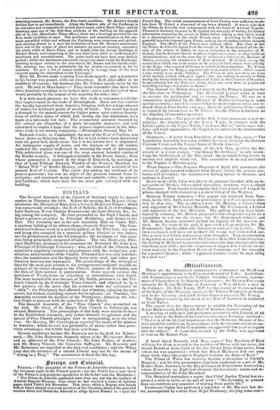jortign anb eolonfal.
FRANCE.—The pamphlet of the Prince de Joinville continues to be the foremost topic in the French papers ; but the Patric has a new story of the Prince's independent opposition to his father and the Ministers- " The _Prince de Joinville applauded more than any one else the conduct of Admiral Dupetit-Thouars; from whom he had received a letter of eighteen pages, dated Tahiti, 9th November. This letter, which a Deputy who stands well at Court showed to several members of the Chamber, detailed the powerful motives which had forced the Admiral to oblige Queen Poroare to respect the French flag. The verbal remonstrances of Lord Cowley were sufficient to ob- tain from M. Guizot a disavowal of our brave Admiral. It was in vain that the Prince de Joinville had endeavoured, with the letter of Admiral Dispetit- Thouars in his hand, to prove to M. Guizot the necessity of waiting for further information respecting the events at Tahiti before taking a step which would be a discouragement to the whole French navy. According to M. Guisot, powerful interests imposed upon France such an act of condescendence towards England. The efforts of the Prince were without effect. But when at last the Prince de Joinville learnt from the mouth of M. Reine himself all the de- tails of the seizure of Tahiti, he was so indignant at the cowardice of Guizot, that he declared that he would no longer serve under so disgraceful an Administration ; and on the same day he addressed a letter to the Minister of Marine, resigning his commission of Rear-Admiral. M Guizot, seeing the mortal blow which was to be struck at the policy of his Cabinet, went adroitly to the King; who required of his son to withdraw his resignation. The Prince de Joinville gave the King a respectful hut immoveable refusal ; which closed a very stormy scene at the Tuileries. The Prince at last, moved by the tears of his mother, yielded, with great regret ; but. not wishing to remain in Paris during the interpellations on the subject of Tahiti in the Chamber of Deputies, he precipitately left the Tuileries, before there was even time to prepare his travelling-carriage, and posted to Havre."
The Journal ties Danis alluded directly to the Prince's pamphlet for the first time on Wednesday. The Ministerial journal seeks at once to censure the publication and to excuse the Prince. He was oa a commission appointed by the Minister of Marine to investigate some special questions ; and it is assumed that he made copious notes and re- duced them to form for his own use ; while the publication of the result is imputed, by insinuation, to M. 'riders: but the Prince is lectured on the impoliey of excessive openness.
SWITZERLAND.—The papers of the 19th instant announce a new re- volution : the inhabitants of the Lower VelaiS, in concert with the Liberal party in the Upper Valais, " Ia Jenne Suisse," are in open Wdr- fare ; and their opponents in the Upper have called for the intervention of the Vorort.
GERMANY.—A letter from Frankfort, of the 15th May, says—" The Legislative Assembly has today ratified the treaty between the German Customs Union and the United States of North America."
GREECE.—Letters from Athens, of the 6th May, mention the dis- covery of a secret society, " the Grand Brotherhood," closely resem- bling the brotherhood of the Illuatinati : the members being sworn to secrecy and implicit obedience. The association is mostly attributed to the Nappist or Russian party.
WEST INDIES.—The Jamaica Despatch of April 23,1 announces the arrival of eight hundred refugees from Hayti; where the utmost con- fusion still prevailed ; the insurrection having spread to Jeremie, and perhaps to Jacmel.
Down to the 19th, Cuba was also in the greatest disorder, with an in- surrection of Blacks ; whose chief operations, however, were confined to Matanzas. Four hundred insurgents had been seized and lodged' in prison, charged with attempting a general rising of the Negroes.
BRITISH NORTH AMERICA.—The papers last received from Mon- treal, to the 18th April, report the proceedings at a Parliamentary elec- tion in that city. The candidates were Mr. Molson, a Conservative and supporter of Sir Charles Metcalfe, and Mr. Drummond, a Liberal and supporter of the late Ministers. The polling having been inter- rupted by violence, Mr. Molson proposed to his antagonist to join in a requisition to call out the troops : hut Mr. Drummond refused ; and Mr. Molson, having protested against the legality of the elec:ion, re- tired. At the close of the poll, it presented a large majority for Mr. Drummond ; but the other side threaten to contest it by petition. The riots continued, and were not subdued till troops had been called out. One person was killed, and several were wounded. This nianitestation is regarded as very untoward for Sir Charles Metcalfe's Administration: the feeling in Montreal is considered to resemble that entertained its the rebellious year 1837; and the occurrence is supposed to indicate an ad- verse majority in the Canadian House of Commons, and the necessity for a general election ; while "a general election would be next thing to a civil war." 1


























 Previous page
Previous page